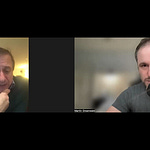As promised, here is Q&A #2, part 2, with
and . I loved hearing their different perspectives on some of the questions we touched on in the first Q&A with and . We discuss critics of psychiatry, ADHD, bipolar disorder, psychedelics, PTSD & borderline personality disorder, and more. It was a great conversation, and I hope you enjoy it as much as we did. Timestamps below.(And in case you missed the first two Q&A’s):
As always, thank you for watching/listening.
Timestamps:
00:00 - 05:28: How do respond to critics of psychiatry (eg. Peter Gøtzsche) in an evidence-based way?
05:28 - 26:57: A bunch on ADHD: What do we think about the rising rates of ADHD diagnoses and stimulant prescribing? To what extent is ADHD a culturally-dependent condition? Are we being too moralistic about giving stimulants to people who could benefit from them, regardless if they “technically” meet criteria for an ADHD diagnosis? How does our current culture and economy affect those with attention/concentration problems? How to draw the line between using stimulants to “correct a deficit” vs. “enhancement”? Should that line be drawn at all?
26:57 - 30:20: What’s the deal with all the subtypes of bipolar disorder? Is this clinically meaningful or just academic hair splitting? Thinking about bipolar “types” vs “spectrum”.
30:20 - 34:45: I ask Awais his thoughts on prescribing a combination antipsychotic + antidepressant (eg. olanzapine + fluoxetine) for bipolar disorder, as opposed to a mood stabilizer, eg. lithium.
34:45 - 51:55: Gary and Awais’ thoughts on MDMA, psilocybin, LSD, and other psychedelics. Discussion of bad trips. Uses of psychedelics for “life problems” vs. “psychiatric problems”. The failure of words to describe the power of psychedelic experiences.
51:55 - 59:00: “What role does psychiatric medication stewardship play in your practice? Can this concept from infectious disease (antimicrobial stewardship) be applied in psychiatry wherein psychopharmacological treatment is reserved for the most severe cases in favor of minimizing psychotropic use in the population? Are there philosophically useful ways in which this concept might be applied in psychiatry?”
59:00 - 1:06:25: Should psychiatry and neurology be separate specialities? Why or why not?
1:06:25 - 1:16:33: Are Complex-PTSD (CPTSD) and Borderline Personality Disorder the same thing with different names? Discussion of trauma and diagnostic uncertainty.
1:16:33 - 1:19:28: Have we ever used the DSM in practice?
1:19:28 - 1:23:40: Favorite psychiatry jokes. Wrapping up.



















Share this post